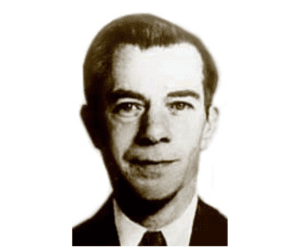Just Like Willie Sutton, You Can Bank On It |
What did Willie Sutton Do? He robbed banks. But he wasn’t afraid to rob other places.
The Willie Sutton Rule
When asked by a reporter about why he stole from banks, Sutton answered, “Because that’s where the money is.” It should be noted that Sutton denied ever saying that.
Read more about The Willie Sutton Rule
Early Years
William Francis “Willie” Sutton attended school through eighth grade and then left home to find a job.
The Beginning of a Career
Sutton began his criminal career in 1919 at the age of 18 when he and two others stole $16,000. The three were soon caught. No charges were filed against them because of a family friendship.
As an aside, it makes one wonder if Sutton would have pursued a criminal career had he been forced to pay for his first crime when he was only 18.
An Unusual Criminal
Even though a robber, Sutton had the reputation of being a gentleman; people present at his robberies said he was quite polite. Sutton was also very well dressed.
In 1950, Willie Sutton became a member of the FBI’s Ten Most Wanted list.
Disguises
Because of his various disguises, Willie Sutton was given two nicknames, “The Actor” and “Slick Willie.”
Sutton pulled off a Broadway jewelry store robbery in broad daylight, disguised as a postal telegraph messenger. Sutton’s other disguises included a policeman, messenger, and maintenance man.
Profit
Over the course of his career, Sutton stole an estimated two million dollars.
Two million is a lot nowadays but not nearly the worth that it was in the 1930s and ‘40s.
Loss
In and Out
Sutton was a very innovative man, not only as a thief but in his prison escapes.
In June 1931, Sutton was sentenced to 30 years. He escaped on December 11, 1932 by scaling the prison wall on two 9-foot sections of ladder that were joined together.
On February 5, 1934, Sutton was sentenced to serve 25 to 50 years, On April 3, 1945, Sutton and 11 other convicts escaped prison through a tunnel. On this one, Sutton was recaptured the same day by Philadelphia police officers.
Sutton was then sentenced to life imprisonment. On February 10, 1947, Sutton and other prisoners dressed as prison guards and carried two ladders across the prison yard to the wall after dark. When the prison’s searchlights hit him, Sutton yelled, “It’s okay,” and no one stopped him.
On February 18, 1952, Sutton was arrested by New York City police. Sutton was given a life sentence plus 105 years.
The Final Out
Sutton’s health began to fade; he had emphysema and was preparing for a major operation on arteries in his legs. Because of his physical condition, the New York State penal authorities decided that Sutton did not have to serve out his life sentence and 105 years.
On Christmas Eve 1969, 68-year-old Willie Sutton was released from Attica State Prison.
An Interesting End
In 1970, Sutton was given a job which boggles the mind. Sutton did a television commercial to promote the New Britain, Connecticut, Bank and Trust Company’s new Master Charge credit cards, the first credit card in the state to carry the holder’s identifying photograph.
The commercial began with Sutton holding a card with his photo on it and saying, “They call it the Face Card”. Then he said, “Now when I say I’m Willie Sutton, people believe me.” An announcer finished the commercial with, “Tell them Willie Sutton sent you.”
Sutton co-authored two books based on his life, I, Willie Sutton (1953, with Quentin Reynolds) and Where the Money Was (1976, with Edward Linn).
On November 2, 1980, Willie Sutton died in Spring Hill, Florida, at the age of 79.
If you’d like to receive an email notification about new posts, sign up for my newsletter here.




